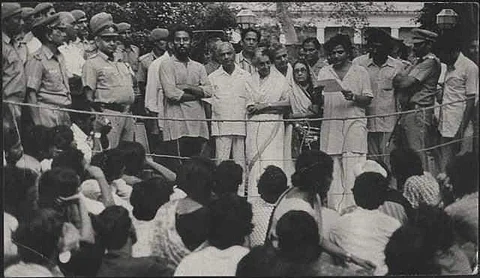

The Emergency of 1975 is repeatedly called the darkest period in India's history. It was during those dark days, that Communist Party of India leader, Sitaram Yechury, then the President of the JNU Students' Union led a student march to the then PM Indira Gandhi's house and while he stood next to her, he read out the reasons why she should step down as the University's Chancellor. And she stepped down. Today, Yechury says our days are darker. Much darker.
"Even at a time like that, we could march. I led the march to Mrs Gandhi's house, brought her on to the road and presented the memorandum. It is the right of students, not just in JNU but everywhere to protest and have their voice heard by lawmakers. It is their fundamental right. Now, what happened the day before yesterday is a serious violation of that right. That's why these days seem darker," Yechury says, referring to how JNU students were blockaded when they tried to march to parliament and then lathicharged and beaten.
The excesses of the Delhi Police have come in for harsh criticism, especially after several students have reported injuries and bad treatment while detained in their custody, "Even during the Emergency there wasn't such massive police deployment. That's why I say that this is worse than the Emergency," Yechury recalled.
Yechury said that when the then Education Minister had come to the University to address the students for some function, he and several others stood up bearing black flags, "As a protest against the Emergency, I and many others stood up with black flags in front of the minister in the meeting. Even then the police didn't behave the way they are behaving now. During Emergency, I remember Indira Gandhi was supposed to come for a University court meeting as she was the Chancellor and all that we said was, 'No' since it's a time of Emergency we won't permit her to come inside the campus and the venue of the meeting was changed," the political leader tells us.
What was different then? "That was the greatness of democracy, which is precisely what we are lacking now," Yechury says. Does the leader think that we can ever recreate that iconic photo of a student President standing beside the PM with a memorandum in hand? Reading out why they should be stepping down from their position? "Well, now the MHRD has decided to meet them so let's see what happens?" Yechury says.
However, when the VC of the University himself isn't willing to meet the students, what can really be expected, we ask. "For any proposal, the VC is supposed to conduct a discussion with the student, teacher community. That is the normal practice. But he chose to act unilaterally and when the students wanted their voice to be heard, he refused to listen to them. That is completely unheard of. Maybe we had such instances during the Emergency but before and after the Emergency there have been many many occasions where we've had long conversations with the VC," he explained.
Even though the JNUSU of '75 has a place in history for doing something so iconic, Yechury says that what the students are doing now is much braver, "In comparison, it looks what the students are doing now is much braver than what we did during the Emergency. Especially in comparison to the police brutality two days ago."
